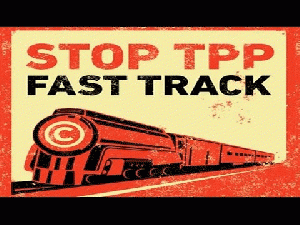Reprinted from The Nation
President Obama takes it personally when Americans disagree with his free-trade fundamentalism. He keeps griping about the activists who usually support his agenda but are passionately opposed to his request for "fast-track" authority to bypass congressional input and oversight on a sweeping Trans-Pacific Partnership trade deal.
The president has a practical problem: if most congressional Democrats align with the activists rather than the White House -- as now seems likely -- they can block Senate action and potentially (in alliance with Republicans) beat the measure in the House. And he knows it.
"There have been a bunch of critics about trade deals generally and the Trans-Pacific Partnership," he told the crowd that was assembled last week for his appearance at the corporate headquarters of Nike, a US-based firm that (with its contractors) now employs roughly 40 overseas workers for every one American. "[What's] interesting is typically they're my friends coming from my party."
Instead of listening to their objections, however, Obama has simply suggested that he's right and they're wrong.
The problem is that he has "evidence" is unconvincing. Consider the case of Nike and that 40-1 ratio. Even if everything Obama promises about the benefits of free trade and the TPP were to come true -- an exceptionally unlikely prospect if the history of trade pacts is any guide -- the ratio of overseas workers to Americans employed by Nike and its contractors would shift to roughly 30-1. That best-case scenario, everyone admits, would take more than a decade to be achieved. And, though fewer admit it, much of the new employment would likely involve technical workers developing automated production schemes that reduce rather than increase living-wage employment in the US and abroad.



